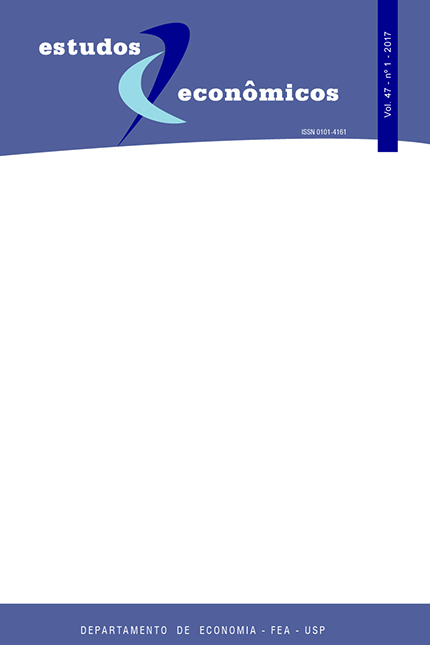The social interaction effect in juvenile consumer decisions of alcohol, cigarettes and other illicit drugs
DOI:
https://doi.org/10.1590/0101-416147136klbKeywords:
Social interaction, Consumption decision, DrugsAbstract
This study analyzed the influence of the social interactions effect of young people in schools, public and private, on the consumption decisions of illicit drugs, alcohol or cigarettes. For this, individual behavior equations were estimated with instruments for social interactions and data from the National School of Health, 2012. The results indicated that the effect of these interactions on consumption decisions of illicit substances are higher compared to the influence of characteristics families. For example, moving a young in a public school where 80% of students smoke to a school where this rate is 50% would completely offset the higher risk of youth smoking associated with the fact of a parent smoking. In addition, the results showed that parental involvement with the activities of the children may be more important to inhibit the consumption of drugs, alcohol and cigarettes than parents' education and family living standards.
Downloads
References
ANGRIST, J. D. The perils of peer effects. Labour Economics, Vol. 30, p. 98-108, 2014.
ANGRIST, J. D.; LANG, K. Does School Integration Generate Peer Effects? Evidence from Boston’s Metco Program. The American Economic Review, Vol. 94, No. 5 (Dec., 2004), pp. 1613-1634, 2004.
BANERJEE, A.V. A simple model of herd behavior. The Quarterly Journal of Economics, Oxford, v. 107, p.797-817, 1992.
BECKER, G. Accounting for Tastes. Cambridge, MA: Harvard University Press, 1996.
BOBONIS, G. J.; FINAN, F. Neighborhood peer effects in secondary school enrollment decisions. The Review of Economics and Statistics, November 2009, 91(4): 695–716, 2009.
BROCK, W. A.; DURLAUF, S. N. Identification of binary choice models with social interactions.
Journal of Econometrics, 140, 52–75, 2007.
CASE, A.; KATZ, L. The company you keep: the effects of family and neighborhood on disadvantaged youths. Cambridge: NBER, p. 1-41 (NBER working paper, 3705), 1991.
COLEMAN, J. S. Foundations of Social Theory. Cambridge, MA: Harvard University Press, 1990.
DUFLO, E.; DUPAS, P.; KREMER, M. Peer effects, teacher incentives, and the impact of tracking:
evidence from a randomized evaluation in Kenya. American Economic Review. 101 (5),
–1774, 2011.
FIRPO, S.; JALES, H.; PINTO, C. Measuring peer effects in the Brazilian school system. Applied
Economics, Volume 47, Issue 32, 2015.
GAVIRIA, A.; RAPHAEL, S. School-based peer effects and juvenile behavior. The Review of Economics and Statistics, May 2001, 83(2): 257–268, 2001.
HANUSHEK, E. A.; KAIN, J. F.; MARKMAN, J. M.; RIVKIN, S. G. Does peer ability affect student
achievement? Journal of Applied Econometrics. 18: 527–544, 2003.
IBGE, 2013. PESQUISA NACIONAL DE SAÚDE DO ESCOLAR, 2012. Instituto Brasileiro de Geografia e Estatística – IBGE. Rio de Janeiro, 2013. Disponível em: http://biblioteca.ibge.gov.br/visualizacao/livros/liv64436.pdf
KREMER, M.; LEVY, D. Peer Effects and Alcohol Use among College Students. Journal of Economic
Perspectives - Volume 22, Number 3 – Summer, Pages 189–206, 2008.
LENAD. II LEVANTAMENTO NACIONAL DE ÁLCOOL E DROGAS - 2012. Ronaldo Laranjeira
(Supervisão) [et al.], São Paulo: Instituto Nacional de Ciência e Tecnologia para Políticas Públicas de Álcool e Outras Drogas (INPAD), UNIFESP, 2014.
LUNDBORG, P. Having the wrong friends? Peer effects in adolescent substance use. Journal of Health Economics 25 (2006) 214–233, 2006.
MANSKI, C. F. Identifications Problems in the Social Sciences. Cambridge, MA: Harvard University Press, 1995.
POWELL, L. M.; TAURAS, J. A.; ROSS, H. The importance of peer effects, cigarette prices and
tobacco control policies for youth smoking behavior. Journal of Health Economics 24 (2005)
–968, 2005.
Downloads
Published
Issue
Section
License
Copyright (c) 2017 Kalinca Leia Becker

This work is licensed under a Creative Commons Attribution-NonCommercial 4.0 International License.
By submitting an article, the author authorizes its publication and attests that it has not been submitted to any other journal. The original article is considered final. Articles selected for publication are proofread for grammatical and orthographic errors. The journal does not pay rights for published articles. The Institute of Economic Research from the School of Economics, Business and Accounting of the University of São Paulo (Instituto de Pesquisas Econômicas da Faculdade de Economia, Administração e Contabilidade da Universidade de São Paulo) owns the journal's copyright.





 Atualizado em 14/08/2025
Atualizado em 14/08/2025